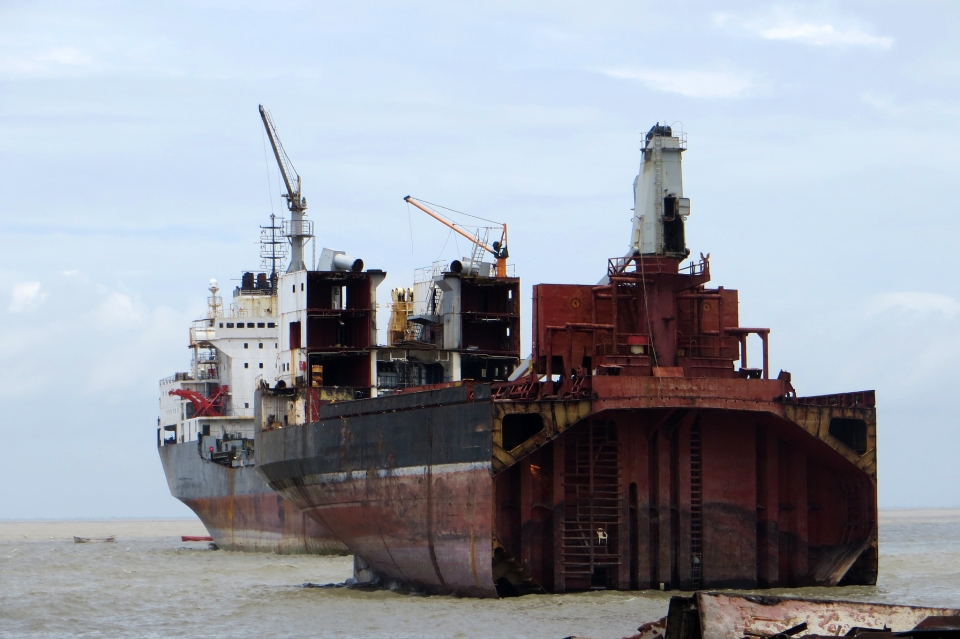Pakistan has acceded to the Hong Kong International Convention for the Safe and Environmentally Sound Recycling of Ships (HKC). As a result, all major ship recycling states have now become a party to the IMO’s HKC.
The country deposited the instrument of accession with International Maritime Organization (IMO) Secretary-General Kitack Lim at IMO Headquarters in London on 30 November. This follows an IMO-run national seminar in Karachi, Pakistan (13-15 November) to support the country’s implementation of the Convention and related Guidelines.
Also read: A global standard for ship recycling
Hong Kong Convention
The Hong Kong International Convention for the Safe and Environmentally Sound Recycling of Ships (the Hong Kong Convention) was adopted in 2009 and will enter into force on 26 June 2025.
It is aimed at ensuring that ships, when being recycled after reaching the end of their operational lives, do not pose any unnecessary risks to human health, safety and to the environment. It embraces the “cradle to grave” concept, addressing all environmental and safety aspects relating to ship recycling, including the responsible management and disposal of associated waste streams in a safe and environmentally sound manner.
The Convention places responsibilities and obligations on all parties concerned – including shipowners, ship building yards, ship recycling facilities, flag states, port states, and recycling states.
Upon entry into force of the Hong Kong Convention, ships to be sent for recycling will be required to carry on board an Inventory of Hazardous Materials. Ship recycling facilities authorised by competent authorities will be required to provide a Ship Recycling Plan, specific to each individual vessel to be recycled. Additionally, governments will be required to ensure that recycling facilities under their jurisdiction comply with the Convention.
Also read: In pictures: Bulk carrier OS 35 leaves Amsterdam port in small pieces
Countries that have signed the HKC
The Hong Kong Convention now has the following contracting parties: Bangladesh, Belgium, Republic of the Congo, Croatia, Denmark, Estonia, France, Germany, Ghana, India, Japan, Liberia, Luxembourg, Malta, the Netherlands, Norway, Pakistan, Panama, Portugal, São Tomé and Príncipe, Serbia, Spain, and Türkiye.
Also read: In pictures: Two halves of OS 35 wreck pass through IJmuiden locks on lift barge Fjord
BIMCO welcomes Pakistan joining
According to international shipping association BIMCO, each year, Türkiye, India, Bangladesh and Pakistan together recycle around 95 per cent of the world’s recycled tonnage. Because of this, any ship soon to be recycled will need to abide by the principles of the HKC.
Precisely because of the global impact the ratification of Pakistan has, BIMCO anticipates that all flag states will soon follow Pakistan’s lead.
BIMCO: ‘The accession to the HKC by Pakistan, a key ship recycling state, underlines a greater global trend. All major non-OECD recycling states have now indicated their willingness to receive end-of-life ships for recycling. This is evident in the significant time, money, and effort these states and their industries have invested towards meeting the HKC requirements. The past decade has seen unprecedented improvements, buoyed by the prospect of the HKC coming into force.’
Aligning EU regulations
The Hong Kong Convention has an EU equivalent, the EU Ship Recycling Regulation (EU-SRR), with slightly stricter requirements and geographical restrictions already in force. Moreover, we also have the Basel Convention and the Basel Ban Amendment, which are UN directives. The Basel Ban is applicable to all ships becoming waste in Organisation for Economic Co-operation and Development (OECD) territories.
Under the EU-SRR, EU-flagged ships can only be recycled at EU white-listed recycling facilities. As Martijn van Wijngaarden puts it in his recent article on ship recycling for SWZ|Maritime: ‘The restriction to EU-listed yards has drawn criticism from shipping and recycling parties worldwide. Only a very small portion (around five per cent annually) of the world’s ship recycling activities are actually carried out in Europe, including the UK and Norway. Insisting that only EU authorised yards have the capability to recycle correctly, is a narrow Eurocentric view of the recycling industry and not at all in keeping with the global nature of shipping.’
BIMCO agrees that it should also be possible to recycle ships at HKC compliant yards: ‘We believe it is essential for the European Union and its member states and the states that are party to the Basel Convention (UNEP) to acknowledge and respond to the call from these recycling states [Türkiye, India, Bangladesh and Pakistan, ed.]. It would be unjust to prohibit ships from being recycled at yards that meet the HKC standards, especially considering the vast improvements made over recent years and the need for steel in these developing economies.’
Picture: Ship recycling in Bangladesh (by IMO).








